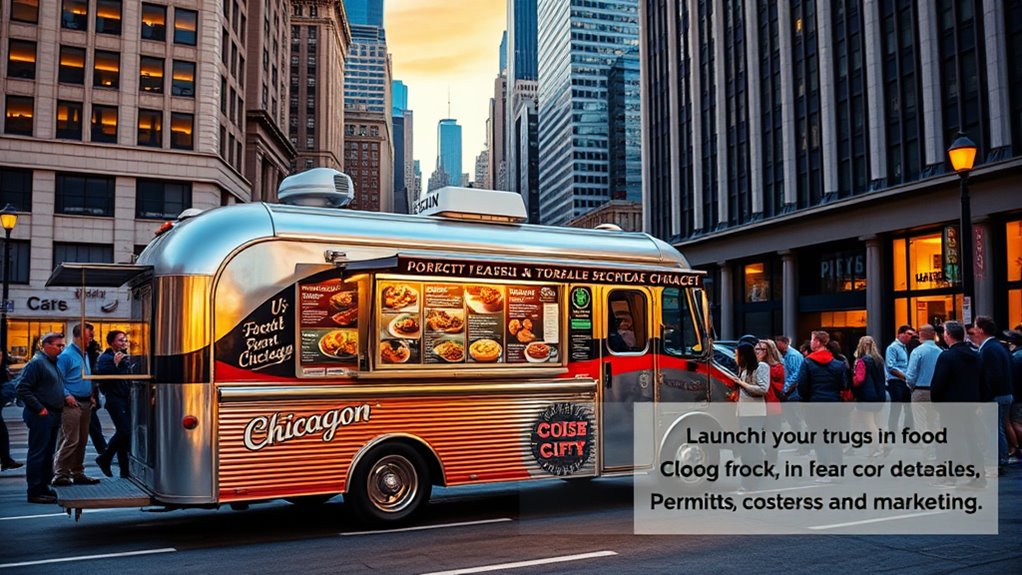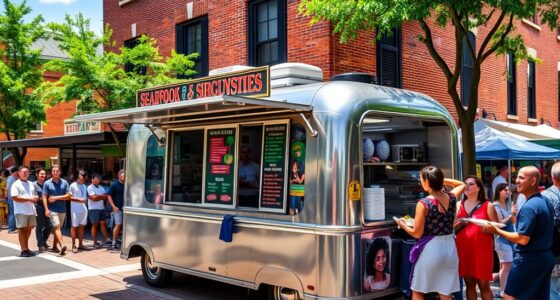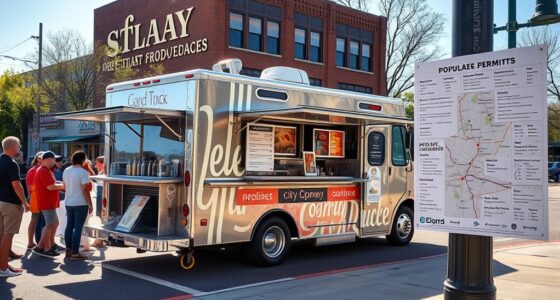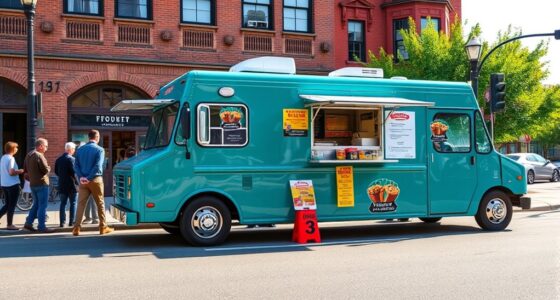To open a food truck in Chicago, you’ll need permits like a Mobile Food Preparer (MFP) and Mobile Food Dispenser (MFD), plus licenses, inspections, and GPS requirements. Your costs can range from $40,000 to over $175,000 for the truck, plus permits, equipment, and inventory. Prime locations include spots near downtown, festivals, and transit hubs. Crafting a menu with local ingredients and strong marketing strategies will boost your success—continue to explore how to make your food truck thrive in Chicago.
Key Takeaways
- Obtain necessary permits including MFP, MFD, business license, and health & fire safety inspections before operating.
- Budget $40,000–$175,000 for truck purchase, $45,000 for equipment, plus permits, licenses, and initial inventory costs.
- Target high-traffic areas like River North, The Loop, and events such as Taste of Chicago for maximum visibility.
- Source local, seasonal ingredients and incorporate Chicago flavors to develop a fresh, appealing menu.
- Use social media, events, and local partnerships for marketing, branding, and building a loyal customer base.
Navigating Chicago’s Permit and Licensing Requirements
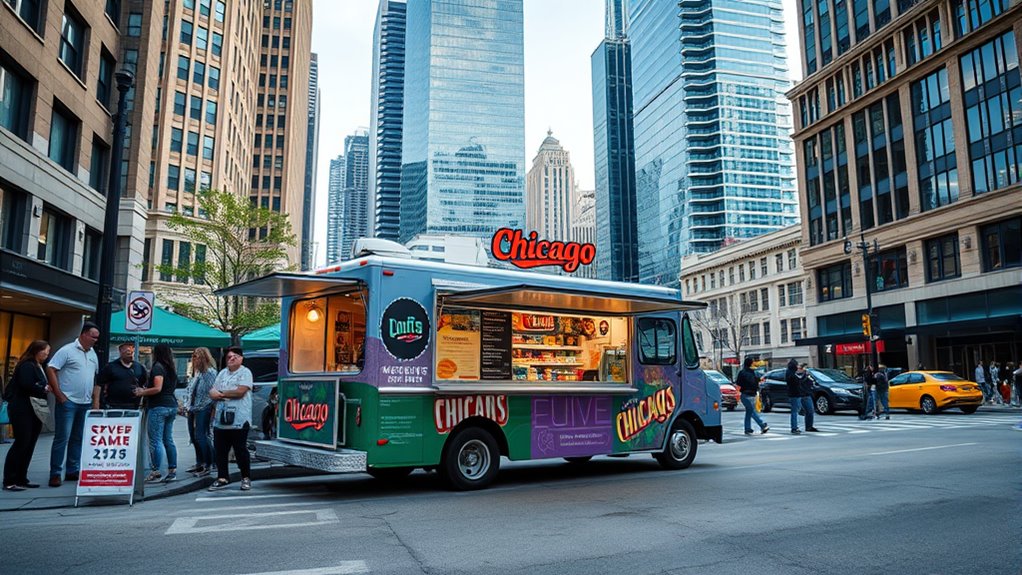
Understanding Chicago’s permit and licensing requirements for food trucks can seem complex, but understanding the key steps makes the process manageable. You’ll need specific licenses depending on your offerings: a Mobile Food Preparer (MFP) license if preparing food on the vehicle, or a Mobile Food Dispenser (MFD) license for pre-packaged items. If you prepare food off-site, you must obtain a Shared Kitchen User license, as cooking at residences isn’t allowed. You’ll also need a business license with an EIN, Illinois State File Number, and Illinois Department of Revenue ID. Food trucks must have a functioning GPS system for location tracking. You’ll submit details of your commissary, undergo health and fire safety inspections, and provide detailed fire safety plans. Proper documentation and compliance are essential to operate legally in Chicago. Additionally, you may need to obtain a Local Health Department Food Truck Permit and a Fire Safety Permit if applicable, depending on your vehicle’s equipment and safety features.
Estimating Startup and Operating Expenses in the Windy City
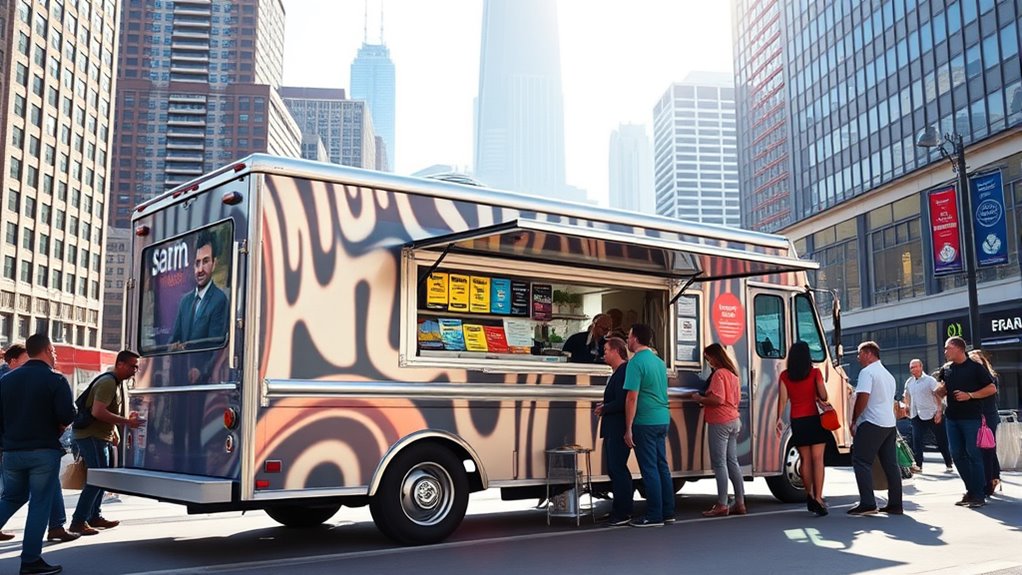
Estimating startup and operating expenses for a food truck in Chicago requires careful planning, as costs can vary widely based on your choices and scale. The truck itself can cost between $40,000 and $175,000, depending on whether you buy new, used, or customize. Kitchen equipment typically adds around $45,000 for commercial-grade appliances tailored to your menu. Permits, licenses, and insurance can range from about $2,000 to over $28,000 annually, with licensing fees being a significant variable. Initial inventory costs are usually between $2,000 and $4,600, covering ingredients and supplies. Ongoing expenses include staffing—around $6,000 monthly for two employees—maintenance, fuel, and marketing, which can take up 12–20% of revenue. Proper budgeting guarantees your food truck’s financial health from day one. Market fluctuations and seasonal demand can also impact your revenue and expenses, so planning for variability is essential.
Identifying Prime Locations for Food Truck Success
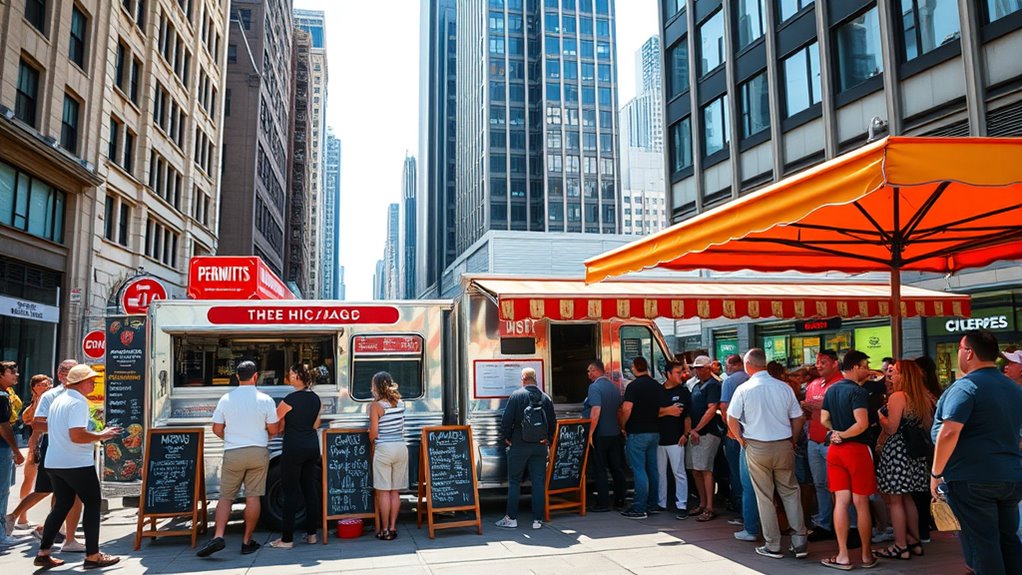
To find the best spots for your food truck, focus on high foot traffic areas like busy downtown districts, transit hubs, and near popular parks or universities. Consider parking at event and festival locations, where demand spikes during peak times. Make sure to secure the right permits, especially in strategic locations, to stay compliant and maximize your exposure. Additionally, understanding seasonal variations can help you choose the optimal times and locations for your food truck’s success.
High Foot Traffic Areas
Where are the best spots to set up your food truck in Chicago? High foot traffic areas are key. The Near North Side, especially River North, Streeterville, and the Gold Coast, draws tourists, office workers, and residents daily. The Loop offers dense pedestrian activity thanks to theaters, museums, and transit hubs like Union Station. The West Loop’s Fulton Market District and tech campuses attract lunch crowds and evening diners. Major streets like North Michigan Avenue and State Street see consistent crowds, especially on weekends and during events. Randolph Street, known as Restaurant Row, is popular during lunch and dinner. Easy transit access and pedestrian-friendly zones boost foot traffic, making these locations ideal for food trucks. Additionally, understanding foot traffic patterns can help optimize your location choices for maximum visibility and sales.
Event and Festival Spots
Hosting your food truck at Chicago’s major festivals and neighborhood events can considerably boost your sales and visibility. Events like the Chi Food Truck Fest (Fridays at Daley Plaza), the Chicago Food Truck Festival, and Taste of Chicago draw diverse crowds and offer prime opportunities for exposure. These city-supported festivals often feature entertainment, family activities, and neighborhood pop-ups, expanding your reach beyond downtown. Timing is essential—weekend afternoons or evenings maximize attendance, especially during lunch and dinner hours. Participation requires proper mobile food licenses and event applications, with vendor fees and regulations varying by event. Smaller neighborhood festivals like West Chicago’s Food Festival and pop-ups in parks provide access to different demographics, helping you build local loyalty and reduce competition. These spots are ideal for increasing sales and brand recognition. Additionally, leveraging artificial intelligence tools can help optimize your marketing strategies across social media and local advertising channels, reaching more potential customers effectively.
Strategic Parking Permits
Have you considered how strategic parking permits can make or break your food truck’s success? Securing the right permits guarantees you can operate legally in prime locations without risking fines or shutdowns. In Chicago, you need permits specific to food trucks, along with GPS compliance to meet city regulations. Target high-traffic areas like street parking near office buildings, farmers markets, and busy entertainment districts, but remember, you can’t park within 200 feet of restaurant entrances during the day. Private property permits are valuable—just get owner approval and follow zoning rules. Use GPS tracking and live location sharing to attract customers while respecting the four-hour service limits at designated spots. Proper permit management helps you maximize visibility and sales without legal complications. Understanding local regulations is essential to avoiding penalties and ensuring smooth operations, especially when incorporating vertical storage solutions to optimize your truck space efficiently.
Crafting a Menu and Pricing Strategies for Local Markets
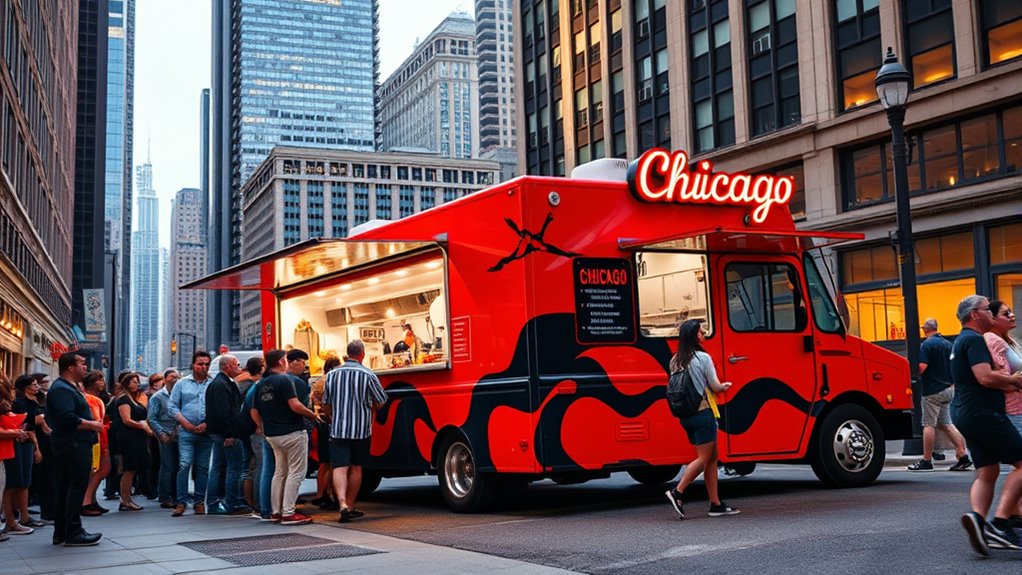
To succeed in Chicago’s competitive food scene, you need to craft a menu that highlights local ingredients and appeals to local tastes. Balancing ingredient costs with perceived value helps you set prices that attract customers while maintaining profitability. By sourcing fresh, local produce, you can create unique dishes that stand out and resonate with your community. Incorporating seasonal changes into your menu planning can help keep your offerings fresh and relevant throughout the year.
Sourcing Local Ingredients
Wondering how to craft a menu that highlights Chicago’s local flavors while keeping costs in check? Start by partnering with Chicago-area farmers markets, cooperatives, and urban farms to access fresh, seasonal produce directly. This large network of local suppliers reduces transportation costs and your carbon footprint while supporting local agriculture. Establish relationships with small-scale producers like artisanal cheese makers and honey suppliers to add unique touches to your menu. Consider CSA boxes for a steady supply of fresh ingredients at negotiated prices. Focus your menu around seasonal availability, rotating dishes based on harvest cycles and using preservation methods like pickling to extend ingredient use. Incorporating hydrotherapy-inspired techniques, such as using hot and cold water treatments for food prep, can also enhance freshness and quality. Highlight the local sourcing story on your menu to build authenticity and trust with customers, making your food truck stand out in Chicago’s vibrant food scene.
Balancing Cost and Value
Balancing cost and value is essential when crafting a menu and setting prices for your Chicago food truck. You need to guarantee your prices reflect both customer perceptions and operational costs. Think about these key strategies:
- Use food cost percentage to keep ingredient costs between 28-35%, adjusting for dish complexity.
- Apply psychological pricing, like $7.99 instead of $8, to boost perceived value.
- Offer bundle deals that increase sales but carefully monitor margins to avoid sacrificing profit.
- Consider the contrast ratio of your menu presentation and lighting to ensure readability and appeal in various settings.
Building a Marketing Plan to Boost Visibility and Customer Engagement
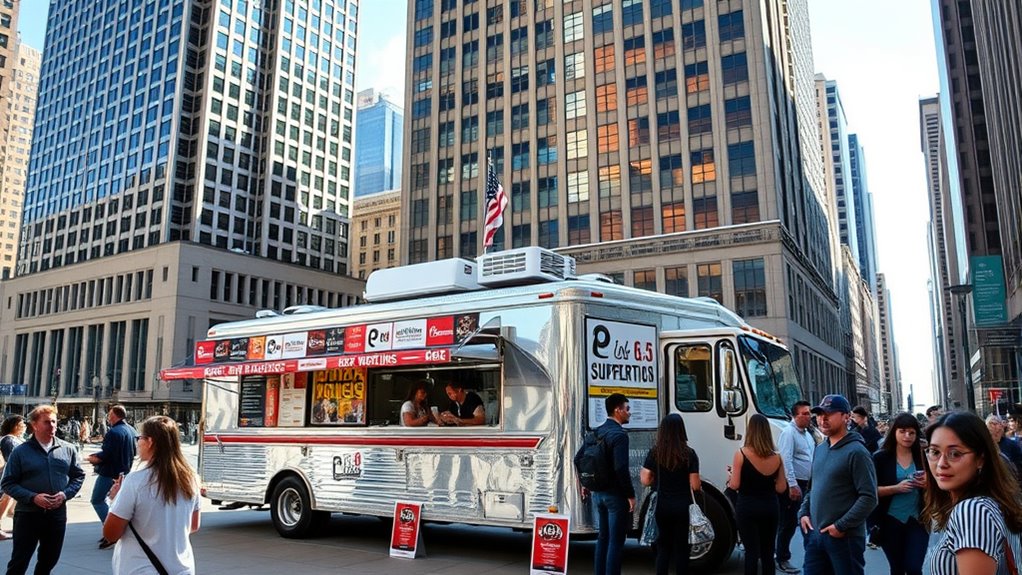
Building a strong marketing plan for your food truck requires a strategic mix of digital and community engagement tactics that increase visibility and foster customer loyalty. Use social media to post high-quality photos, videos, and location updates, making it easy for customers to find you. Engage with followers by replying promptly and running targeted ads on platforms like Instagram and Facebook. Attend Chicago festivals and events, using eye-catching branding and offering tastings to generate buzz. Collaborate with local influencers and brand ambassadors to expand your reach. Create unique experiences through appealing menus, interactive elements, and branded wraps. Finally, optimize your website with local SEO and leverage online reviews to enhance your reputation. Incorporating Jeep Tuning concepts such as customized branding and performance upgrades can also inspire innovative marketing approaches. Here’s a quick overview:
| Tactic | Action Items | Benefits |
|---|---|---|
| Social Media | Post visuals, use hashtags, respond quickly | Increase discoverability |
| Local Events | Attend festivals, offer tastings | Broaden audience |
| Influencer Collaborations | Partner with bloggers, run contests | Boost credibility and reach |
| Digital & SEO | Optimize website, manage reviews | Improve online presence |
Developing a Solid Business Plan and Financial Roadmap
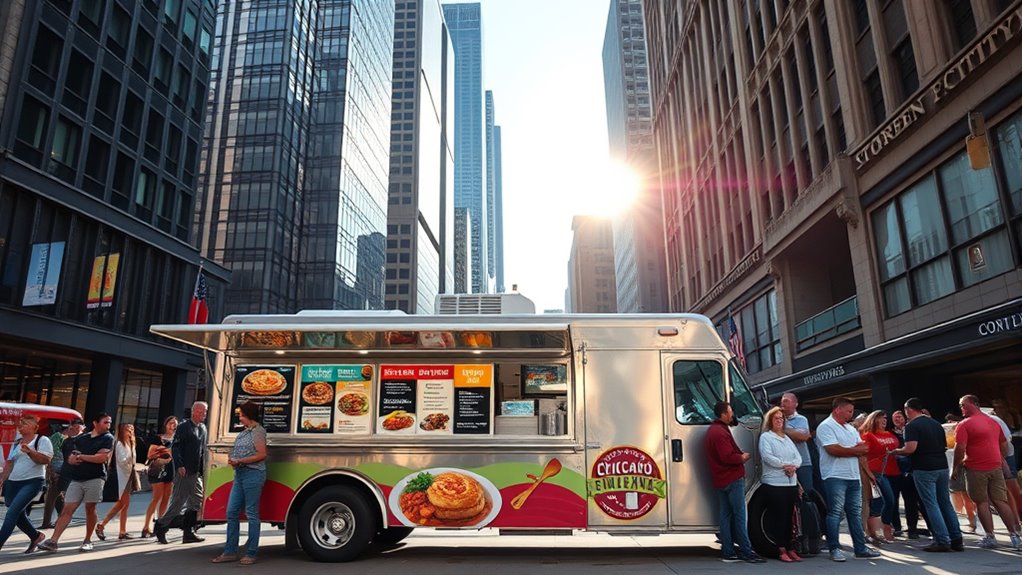
Creating a solid business plan and financial roadmap is essential for turning your food truck idea into a profitable venture. Imagine yourself:
Developing a detailed business plan and financial strategy transforms your food truck dream into a successful, profitable reality.
- Crafting an executive summary that highlights your unique cuisine, target audience, and mission.
- Detailing your operational structure, including locations, truck setup, and legal business form.
- Developing financial projections with clear startup costs, recurring expenses, and profitability milestones.
- Incorporating insights from industry trends and water-based activities to identify potential promotional opportunities and customer engagement strategies.
This plan guides your decisions, helps secure funding, and keeps you on track toward success. You’ll analyze competitors, identify industry trends, and outline strategies to capture your market. Establishing a thorough financial roadmap—including income statements, cash flow, and funding sources—ensures you stay profitable and prepared for growth. With these steps, you’ll build a resilient foundation for your Chicago food truck.
Frequently Asked Questions
How Long Does the Permit Approval Process Typically Take in Chicago?
The permit approval process in Chicago usually takes between 1 to 3 weeks for simple permits. However, if your application involves multiple inspections or additional requirements, it can extend to 2-3 months or more. To speed things up, make sure your application is complete, respond promptly to city requests, and prepare thoroughly for inspections. Delays often happen due to missing documents, inspection failures, or unresolved city debts.
What Are the Common Challenges Faced by Food Truck Owners in Chicago?
Think of Chicago’s food truck scene as a maze with walls built high—this captures the common challenges you face. You encounter strict proximity rules, limited legal parking, and hefty fines that threaten your daily operations. High costs, stiff competition, and regulatory hurdles force many to operate illegally or struggle to stay afloat. These obstacles create a cycle of fines and closures, making it difficult to thrive in the city’s restrictive environment.
Are There Specific Neighborhood Restrictions for Food Truck Operation?
You need to be aware of neighborhood restrictions that limit where you can operate your food truck. Chicago enforces a 200-foot rule near brick-and-mortar restaurants, unless it’s late at night. You also require written property permission for private locations and can’t park on vacant lots. These rules aim to prevent neighborhood disruption, so always check local zoning laws and avoid parking in prohibited areas to stay compliant and avoid fines.
How Can I Effectively Price My Menu to Stay Competitive Locally?
Oh, you’d love to price your menu like a secret agent—shady and unpredictable. But in reality, you should analyze local competitors’ prices, consider customer spending habits, and adjust based on seasonality. Use bundle deals to boost sales and experiment with different price points to find the sweet spot. Keep a close eye on market trends and customer feedback, and your prices will stay competitively sharp without alienating your audience.
What Are the Best Ways to Build a Loyal Customer Base Quickly?
To build a loyal customer base quickly, focus on engaging community events and seasonal promotions that boost visibility and create a sense of belonging. Implement a rewards program with digital coupons and tiered benefits to encourage repeat visits. Maintain a strong online presence with regular updates, respond to reviews, and use social media to connect with customers. Consistent schedules and listening to feedback also foster trust and loyalty rapidly.
Conclusion
Starting your food truck in Chicago means turning your culinary dreams into a vibrant reality on bustling streets. Picture the aroma of fresh food mingling with city sounds, drawing hungry passersby. With careful planning, permits, and a mouthwatering menu, you’ll create more than just a food truck—you’ll craft unforgettable moments. Embrace the journey, and watch as your passion transforms into a flavorful staple in the heart of the Windy City.
